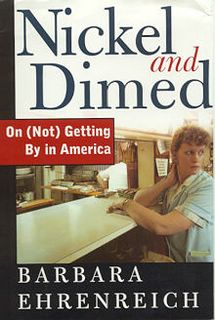Hitting the Nail on the Head
I've been reading Barbara Ehrenreich's fantastic book 'Nickel and Dimed' lately. The book is a great example of the kind of journalism that people just don't do any more. Ehrenreich, a New York Times bestseller, takes an honest stab at joining the ranks of the working poor in various parts of the country, trying to survive at at the sorts of miserable, low-wage service industry jobs available to those masses of people without access to education or helpful connections. Her efforts provide a vivid illustration of the fallacy behind some of the notions that we like to comfort ourselves with, i.e. that the poor deserve our contempt, that their condition is a result of their own laziness, and that all a person needs to do is work hard to pull themselves out of the lower levels of society.

Nickel and Dimed
One extraordinarly insightful quote caught my attention, and strangely it dealt not with economics or social justice, but religion. While attending a service at a revival tent in Maine and being preached to of our collective debt owed to the crucified Christ, Ehrenreich observes:
"It would be nice if someone would read this sad-eyed crowd the Sermon on the Mount, accompanied by a rousing commentary on income inequality and the need for a hike in the minimum wage. But Jesus makes his appearance here only as a corpse; the living man, the wine-guzzling vagrant and precocious socialist, is never once mentioned, nor anything he ever had to say. Christ crucified rules, and it may be that the true business of modern Christianity is to crucify him again and again so that he can never get a word out of his mouth."
I worry about discussing religion here (it seems that it doesn't pay to rock the boat on this subject in this country these days), but I have to note that this passage really spoke to me. How often I have thougth that it is this tendancy in Christianity as it exists in many parts of America, the tendancy toward the subversion of the actual spoken message of Jesus in favor of a puritanical mania obsessed with the sexual behavior of believer and non-believer alike, that drives so many people away from organized religion. I can't help but think sometimes that if many of today's fundamentalists would actually listen to the words of the man that I remember reading about in the Gospels--a man who so far as I recall never mentioned gay marriage but who did seem to care greatly about the poor, the outcast, the very people that society considered the least desireable--they might have some interesting things to think about.

Nickel and Dimed

One extraordinarly insightful quote caught my attention, and strangely it dealt not with economics or social justice, but religion. While attending a service at a revival tent in Maine and being preached to of our collective debt owed to the crucified Christ, Ehrenreich observes:
"It would be nice if someone would read this sad-eyed crowd the Sermon on the Mount, accompanied by a rousing commentary on income inequality and the need for a hike in the minimum wage. But Jesus makes his appearance here only as a corpse; the living man, the wine-guzzling vagrant and precocious socialist, is never once mentioned, nor anything he ever had to say. Christ crucified rules, and it may be that the true business of modern Christianity is to crucify him again and again so that he can never get a word out of his mouth."
I worry about discussing religion here (it seems that it doesn't pay to rock the boat on this subject in this country these days), but I have to note that this passage really spoke to me. How often I have thougth that it is this tendancy in Christianity as it exists in many parts of America, the tendancy toward the subversion of the actual spoken message of Jesus in favor of a puritanical mania obsessed with the sexual behavior of believer and non-believer alike, that drives so many people away from organized religion. I can't help but think sometimes that if many of today's fundamentalists would actually listen to the words of the man that I remember reading about in the Gospels--a man who so far as I recall never mentioned gay marriage but who did seem to care greatly about the poor, the outcast, the very people that society considered the least desireable--they might have some interesting things to think about.






0 Comments:
Post a Comment
<< Home